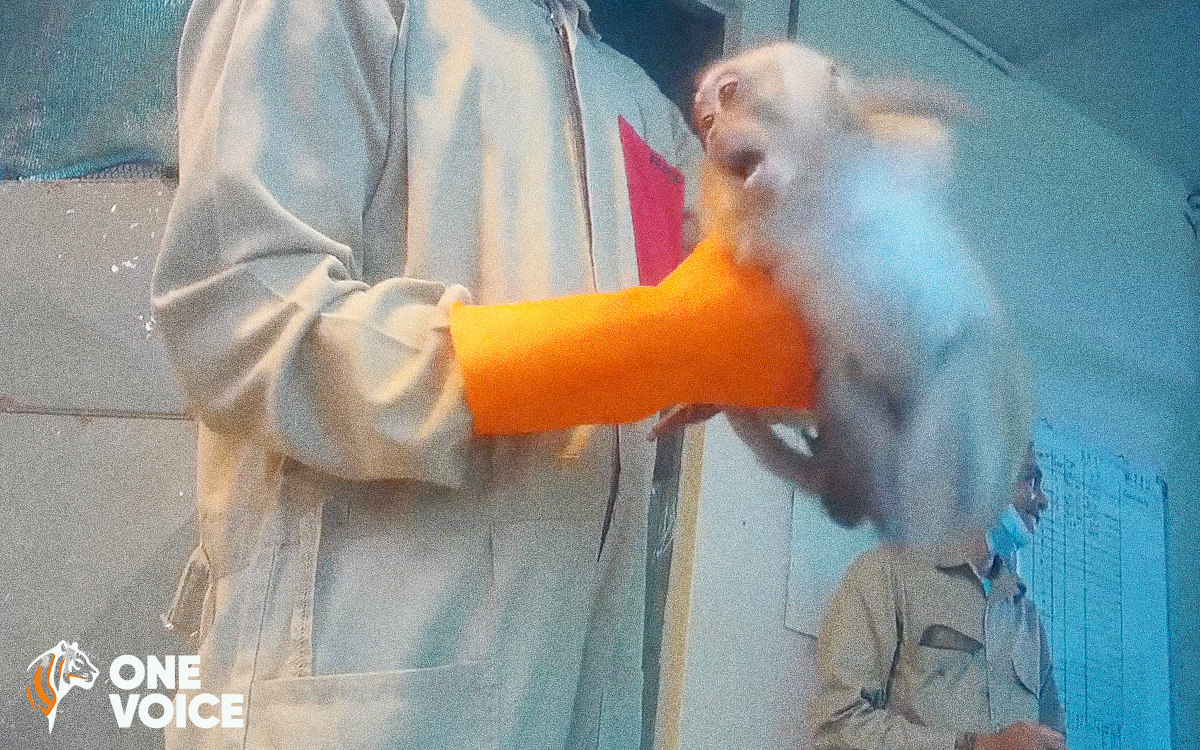
'Monkeys Labs': from condoned mistreatment, proven trafficking, and health risks
In Mauritius, breeding farms have free rein to mistreat primates with no concerns before selling them to laboratories.
Violence, concrete enclosures, and minuscule cages. When hearing that everything is going well for laboratory suppliers, the footage from our investigation within one of the most significant ones seems surreal. However, they echo the recent arrest of a member of the Cambodian government involved in illegal trafficking – not to mention the permanent health risks linked with captivity. One Voice is asking for an end to these practices.
In Mauritius, beyond the restrictions linked to the evaluation of the environmental impact of the set-ups, a law passed in 2013 and reinforced in 2022 is supposed to protect animals against acts of cruelty. It specifically bans “tortur[ing] or otherwise treat[ing] an animal in such a manner as to subject it to distress, pain or suffering” and “keep[ing] or confin[ing] an animal in a cage or other similar structure which is too small to provide the animal with a reasonable opportunity for its natural movement”.
Some situations filmed by our investigators in 2023 at Noveprim directly contradict this legislative text.
Carte blanche and collusion
If truth be told, no legal obligations are imposed on the companies set up in Mauritius to respect regulations from importing countries. And they clearly do not mind. Even the most obvious cases of cruelty (such as the illegal breeding of 250 macaques in squalid conditions, discovered last spring) do not seem to result in any convictions.
As for exporting a primate to a French laboratory, they simply have to prove that they and their parents were bred in a cage. It is still necessary for this to be attested to – instead of only relying on sellers’ statements.
But motivating public powers to follow the law leaves much to be desired. So, last year, the director of the department of wildlife and biodiversity at the Cambodian government arrived in New York. For several years, he facilitated the illegal trafficking of captured long-tailed macaques – a species that is very popular with research teams, to the point that it is classified as ‘endangered’ by the International Union for the Conservation of Nature (IUCN).
Tuberculosis and mass massacres
And it is not over. While wild primates rarely suffer from serious infectious diseases, risk factors are increased in captivity. This concerns animals themselves, but also the human population via zoonotic diseases. This is how, recently, dangerous bacteria was found in the United States during a health check on monkeys coming (again) from Cambodia.
This very real danger explains why breeding farms often carry out diagnostics that involve injecting tuberculininto the eyelid and observing the potential swelling. According to an employee of the company, in the case of a positive result, Noveprim kills all of the individuals in the section concerned.
Let’s end this
It makes you wonder what Member States of the European Union are supposed to do to protect against this mistreatment and these massacres. Are the Mauritian and Vietnamese establishments that supply Francedoing as much as their Cambodian counterparts? Clearly, according to the One Voice investigation with contribution from Action for Primates, the answer is no.
This is why we are inviting you to sign our petition asking for a ban on capturing, the closure of breeding farms, and an end to testing on macaques.
Going further, you can consult our special report and consult the data given year after year and species by species on our dedicated website.
Translated from the French by Joely Justice